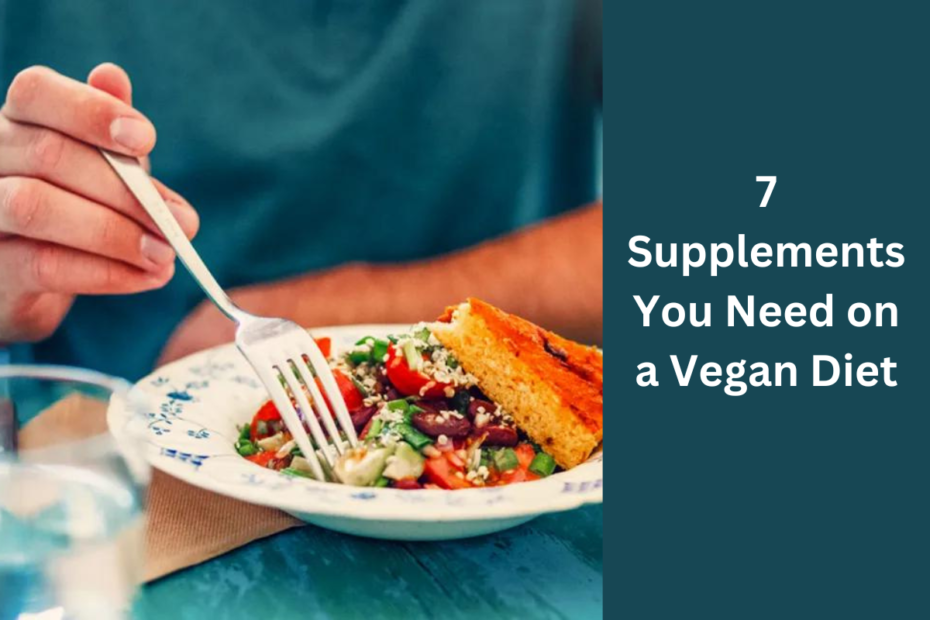7 Supplements You Need on a Vegan Diet:- A vegan diet that is well-balanced can bring several health benefits; nevertheless, in order to guarantee that you are achieving all of your nutritional requirements, it is necessary to give serious consideration to the planning process. There is a possibility that a vegan diet will be deficient in certain critical elements that are often found in animal products; therefore, supplementation is needed. An all-encompassing vegan diet should take into consideration the following seven essential supplements:
7 Supplements You Need on a Vegan Diet
On the other hand, it is absolutely necessary to give serious consideration to the planning process in order to guarantee that you are satisfying all of your nutritional requirements. In light of the fact that a vegan diet that is well-balanced has the potential to bring about a number of health benefits, it is essential to pay careful consideration to the process of planning.
Supplementation is necessary because there is a possibility that a vegan diet would be deficient in certain critical elements that are generally present in animal products. These nutrients are typically found in animal products. The risk of this happening makes supplementation an absolute necessity. Within the context of a vegan diet that is comprehensive, it is important to take into mind the seven essential supplements that are stated below:
1. Vitamin B12
The creation of red blood cells, the function of the nervous system, and the synthesis of DNA all highly depend on vitamin B12. Because it is predominantly found in goods derived from animals, vegans run the danger of not getting enough of it. It is possible for a lack of vitamin B12 to result in anemia, nerve damage, and cognitive problems.
ALSO SEE : The 5 Best Healthy Late-Night Snacks
Supplementation: It is recommended that you take a B12 supplement on a daily basis, with doses ranging from 25 to 100 micrograms, or a weekly dose of 1,000 micrograms. There are a few other types, such as methylcobalamin and cyanocobalamin, with methylcobalamin being the only form that is more readily available to the body.
2. Vitamin D
The absorption of calcium and the maintenance of immunological function are both supported by vitamin D, which is beneficial to bone health. The production of it occurs when the skin is exposed to sunlight; however, vegans who live in regions with minimal sun exposure or who use sunscreen may not create enough of it.
When it comes to supplementation, vitamin D2 is good for vegans and the vegan diet, but vitamin D3, which is typically generated from animal sources, can also be available in vegan versions that are derived from lichen. In most cases, a daily dose of 1,000 to 2,000 international units (IU) is regarded to be adequate for one’s needs.
3. Omega-3 Fatty Acids
The heart and the brain both require omega-3 fatty acids in order to function properly. The use of flaxseeds, chia seeds, and walnuts are all sources of ALA (alpha-linolenic acid). However, a direct supply of EPA and DHA (eicosapentaenoic acid and docosahexaenoic acid) is typically not found in diets that are centered on plant-based lifestyles.
Algal oil supplements are a vegan source of EPA and DHA, and they are available for supplementation. Your daily intake of mixed EPA and DHA should be between 250 and 500 mg.
4. Iron
An essential component for oxygen transport in the blood is iron. When compared to heme iron, which is found in animal products, plant-based iron, also known as non-heme iron, is less easily absorbed. Therefore, vegans should either get a greater quantity of iron through their diet or consider taking iron supplements.
Supplementation: It may be good to take a daily supplement that contains 18 milligrams of iron, preferably in the form of ferrous fumarate or ferrous bisglycinate. This is especially true for women who experience heavy menstrual cycles. An increase in absorption can be achieved by combining iron-rich meals with vitamin C.
5. Calcium
Calcium is necessary for maintaining healthy bones and proper muscular function. There are a lot of plant-based foods that include calcium, but some people might require additional supplementation to achieve their calcium requirements. This is especially true if they do not drink plant milks or juices that have been fortified with calcium.
A supplement that contains between 500 and 1,000 mg of calcium citrate or calcium carbonate on a daily basis can be helpful in ensuring that a suitable amount of calcium is consumed. Consider selecting a supplement that also contains vitamin D in order to facilitate the body’s absorption of calcium.
6. Zinc
Zinc has a significant role in the immune system, the healing of wounds, and the production of proteins. The presence of phytates in whole grains and legumes, which can hinder zinc absorption, can cause plant-based diets to contain a lower amount of zinc than other similar diets.
Taking a supplement that contains 8 to 11 milligrams of zinc on a daily basis, either in the form of zinc citrate or zinc picolinate, can be an effective way to meet your zinc requirements, particularly if you do not consume foods that are rich in zinc, such as legumes, seeds, and nuts.
7. Iodine
Zinc has a significant role in the immune system, the healing of wounds, and the production of proteins. The presence of phytates in whole grains and legumes, which can hinder zinc absorption, can cause plant-based diets to contain a lower amount of zinc than other similar diets.
In order to maintain healthy hormone levels and thyroid function, iodine is essential. If iodine is not consumed through the use of iodized salt or sea vegetables, plant-based diets may be deficient in iodine, which can result in inadequacies.
Supplementation: If you do not routinely consume sea vegetables, taking a daily dose of 150 micrograms of potassium iodide or another type of iodine can help prevent deficits. This is especially true if you do not consume sea vegetables.
